Imagine finding yourself far across the globe in the remote village of Delani, South Africa, population 500 — miles and miles away from Scripps’ lush California campus. You don’t speak the language, and, as a virtual stranger, you need to draw upon all of your interpersonal skills to gain people’s trust.
Your mission: help Delani’s villagers develop and improve their schools, library, sports field, water and sanitation, as well as empower the young people to improve their health and education.
Beth Olesen ’10 accomplished all that during her summer 2008 Global Development Internship (GDI) with the Student Movement for Real Change organization.
Olesen, a Judith Nelson Keep Leadership Grant recipient, is one of many Scripps women who each year take advantage of internships that enhance their academic and personal interests. But more than simply complementing their studies, these internships give students a chance to create professional networks and gain job-specific capabilities.
“An internship is a great way for our students to explore a particular interest in 10 weeks rather than going to graduate school and discovering that they don’t want to pursue that direction,” says Valinda Lee, career counselor in Scripps’ Career Planning & Resources. “Or, students realize how much they love something and want to continue in that field. Working with students to secure internships based on their interests is a big part of what we do.”
From social justice, community-based programs, and international relations to sports, entertainment, and fine arts, the following is a brief glimpse into the wide range of internships Scripps women pursue.
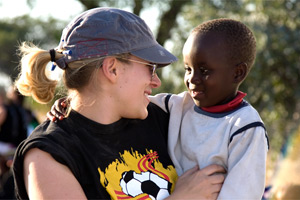 Developing Communities: Beth Olesen ’10
Developing Communities: Beth Olesen ’10
Judith Nelsen Keep Leadership Grant
The first two weeks of Olesen’s time in Delani were stressful. To pull together a day camp for the students of Mahlati Primary School, Olesen had to draw on great personal energy and organization. She had a small team of eight members to help her manage dozens of children, most of whom did not know English.
They sought help from their South African peers. During a weekend soccer tournament, they asked the high school students to assist on opening day. A dozen or so showed up. By the end of the first week, about 20 students had helped them teach, translate, and engage with the students.
Additionally, Olesen and her group took the first steps in creating a resource center for the secondary school students. They created two booklets: one on applying to university and steps to take towards different occupations; the second concentrated on sexual health. The pamphlets were distributed to schools and the community center.
From her internship experience, Olesen gained valuable insights. “I wanted to be put in uncomfortable situations — to see what it was to be a leader every day, to begin to feel the weight of high expectations.” Finally, Olesen wanted to test herself to make sure a career and life built around advocating for human rights was right for her. “I learned from the GDI that I am working to my full potential when I am both challenged intellectually and asked to apply that intellectual work.”
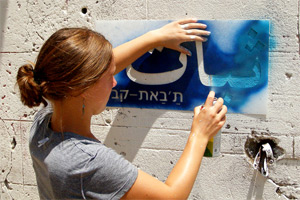 Understanding Israeli-Palestinian Relations: Becky Fogel ’09
Understanding Israeli-Palestinian Relations: Becky Fogel ’09
Conflict Resolution Grant
This past summer, thanks to a generous grant from Margaret Towne D’Albert ’54 to study conflict resolution, Becky Fogel was able to learn more about the Israeli-Palestinian conflict through Sadaka Reut, a Jaffa-based non-profit organization that focuses on peace and conflict resolution.
Fogel, a Jewish American, grew up within an environment supportive of Israel. However, when she was studying abroad in Egypt her junior year, she found her views challenged by fellow students. This led her to realize the importance of education to peace and conflict work. Sadaka Reut provided a perfect fit, as it works to introduce teenagers to Palestinian narratives that are absent in the Israeli school system. According to Fogel, “This education not only empowers Palestinian and Jewish youth as separate groups, but allows them to engage with each other and craft an alternative and integrated community, while still cognizant of broader social disparities.”
Fogel’s primary work centered on activities related to Sadaka Reut’s summer youth campaign which utilized art, music, theater, and public presentations to address the ongoing repression of Palestinians within Israel and the occupied territories. One of her most eye-opening experiences was seeing the process the facilitators went through before working directly with the youth. “I particularly enjoyed learning about the kinds of activism they felt best achieved their goals — and that sometimes they disagreed on how to do this.”
Fogel notes that the internship gave her incredible insight into different forms peace and conflict resolution work can take. “After the summer,” she says, “I realized it was something I definitely want to pursue.”
The Middle East history major is currently writing her thesis on colonial representations of Palenstinian women.
Through her strong commitment to conflict resolution, D’Albert, the grant’s donor, hopes to expand the study to a broader group of Scripps students, perhaps resulting in a seminar at Scripps. “Education is the path away from battle, but the study of such ongoing conflicts is vital to our global survival at all levels,” she says.
Supporting the People of Chiapas: Elizabeth Lopez ’09
Virginia Judy Esterly Award
Through the Virginia Judy Esterly Award, Elizabeth Lopez was able to assist the non-profit Melel Xojobal (“the true light” in the local Tsotsil language) in San Cristobal de las Casas, Chiapas, Mexico. The goal: improve the quality of life for the indigenous urban and rural population in Chiapas, mainly children.
For three months last summer, Lopez lived in the Southern Mexico town on her own. This gave her experiences she would never have had without the Scripps grant, including a close-up view of how international non-profit organizations work to improve communities. As Melel Xojobal’s administrative assistant, she organized the library where the group houses key information. “I was able to read all these studies about the street children of Latin America that I normally wouldn’t have access to.”
Lopez is an active figure on the Scripps campus through the Chiapas Support Committee, which educates the community about the state of Chiapas and fundraises. It was this involvement that led her to pursue an internship with Melel Xojobal.
The next step for the sociology and Chicano studies major includes a return visit to Mexico City, where she hopes to work with other non-profit organizations. “I have already been on two trips to the area, experienced living with indigenous families, and worked closely with the Human Rights Center,” she says. “I am Mexican, and this work is part of my identity.”
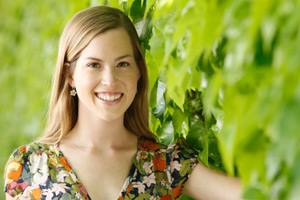 Understanding Brain-Behavior Relationships: Laura Loesch ’09
Understanding Brain-Behavior Relationships: Laura Loesch ’09
Claremont Colleges Neuroscience Fellowship
If you’ve ever watched the television show Lie to Me, you’re probably familiar with the lead character who studies facial expressions and involuntary body language to discover if someone is lying. Laura Loesch undertook a similar project this past summer at Caltech.
One of five recipients of The Claremont Colleges Neuroscience Fellowship, Loesch joined the Caltech Emotion and Social Cognition Lab run under Ralph Adolphs, Bren Professor of Psychology and Neuroscience. The laboratory investigates the neural underpinnings of human social behavior, pursuing questions such as: How do we recognize emotion from facial expressions? How do we make social judgments about other people? How do we look at people’s faces (how do we move our eyes)? How do we make moral judgments about what is right and wrong?
At Caltech, the lab works to answer these questions using various techniques, including assessment of behavior in neurological patients following specific brain damage, recording of electrical activity in the brain of neurosurgical patients, probing the behavior of individuals with neuropsychiatric diseases, such as autism-spectrum disorder, and investigating the behavior and neural activity of neurologically normal people during social cognition tasks.
Over the summer, Loesch worked to understand these questions of social processing by investigating how gaze behavior, a useful window into cognition, changes during deception for both high-functioning autistic and non-autistic individuals in a realistic social setting. The resources available at Caltech allowed her to use a new technique called “head-mounted eyetracking,” which allows the participant to speak as if in a normal conversation, while an eyetracker allows for three-dimensional recording of the participant’s gaze patterns. This allows scientists to study social behavior in an unprecedented realistic setting.
Loesch has continued at the Caltech lab this year as a hired assistant and, based on her research there, will present a poster this summer at the Association for Psychological Science conference.
Loesch has already been accepted into Caltech’s social behavioral neuroscience graduate program, as well as doctoral programs at USC and UCLA. Reflecting on her summer fellowship, Loesch finds that doing this novel research has enhanced her academic career and opened the door to even more opportunities ahead.
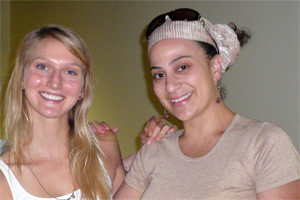 Giving Young People a Voice: Orissa Stewart-Rose ’10
Giving Young People a Voice: Orissa Stewart-Rose ’10
Angelica Kusar Clark Grant
Northern California native Orissa Stewart-Rose remembers seeing the Oakland-based Youth Radio at work when she was a student at Berkeley High School. All she knew about them was they were a non-profit that offered students media training and exposure to the communication industry. Several years later, thanks to the Angelica Kusar Clark Grant, Stewart-Rose got an inside look as an intern at the vibrant, community-based organization.
She says it was the hardest job she’s ever had — and the best.
Youth Radio was founded in 1990 on the belief that underserved youth, ages 14-24, have the creativity, technical skills, and entrepreneurial spirit to become leaders in the multi-media industry and mentors in the community. Staff, volunteers, and interns train young people from under-resourced public schools, community-based organizations, group homes, and juvenile detention centers in broadcast journalism, media production, and cutting-edge technology. Its goals are to strengthen basic life-skills, motivate youth to graduate from high school and attend college, and prepare them for multi-media and other careers.
Stewart-Rose worked in Youth Radio’s education and career area as a youth advisor to 20 students. “I would talk to them about everything from how to improve their studying to writing a résumé and looking for jobs,” she says. She created workshops, tapping into what she had learned in her Core classes about how to engage discussion through a diversity of questions and being open to letting conversations go in different directions. “I was able to put into practice what my professors taught me. I could give Youth Radio students a historical context to what is happening and relevant to them,” she says.
Through the Clark Grant, Stewart-Rose was able to work full time at Youth Radio without having to worry about how to finance her summer. “The organization was so happy to have me, and I was so happy to be there. I feel like I got out as much as I put in. I’ve loved my Scripps academic experience and, before Youth Radio, I felt hungry to put that experience to work.”
Ready for Her Close Up: Katy Lind ’06
As a theatre and dance major, Katy Lind wanted to pursue a job in a creative field. After graduation, she turned to the Scripps alumnae network. It was through this vast resource in Career Planning & Resources that she found Sarah Greenberg ’93, co-president of marketing at Lions Gate Films.
“Sarah had the job I thought I wanted for the rest of my life, and it was a bit nerve-wracking thinking about meeting with her,” says Lind, whose bubbly personality seasons her conversations. A dedicated student at Scripps, she laughs about the time she glibly told her mother: “I want to work somewhere where people wear cute shoes…hip, creative people. So when I walked into the Lions Gate offices, I looked through the glass doors at a woman down the hall with blond hair, a great outfit, and the cutest shoes. She turned out to be Sarah.”
In that first meeting, Greenberg gave Lind a crash-course in navigating the tricky waters of the entertainment industry. “Sarah spent 15 minutes trying to scare me — telling me you work crazy hours, you don’t sleep, won’t have time to see your family,” Lind recalls. “All the while, my eyes were glowing. After Sarah realized she intimidated me as much as she could and I was still excited, she offered me an internship after graduation.”
The job was just as advertised. Far from the glamorous image of attending movie premiers or rubbing elbows with the stars, Lind performed typical “gofer” tasks. “There were days when I thought she was kidding, like when she asked me how fast I can put 600 CDs on her iPod. It was important to remember that the things being asked of me as an entertainment intern were not equal to the level of respect they had for me.”
Greenberg introduced Lind to Lions Gate executives and showed her how to network. Before the end of the summer, a job opened up and Lind jumped in as the assistant to the other co-president of marketing. In her year-and-a-half at Lions Gate, Lind was also helpful in securing internships for two other Scripps students.
Lind has been accepted to several business schools and says she most likely will attend Indiana University in the fall to study brand management.
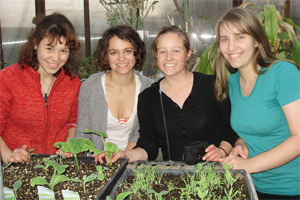 Reaching Out to Incarcerated Women:
Reaching Out to Incarcerated Women:
Hannah Segal ’09
Davis Family Foundation Internship Grant
Hannah Segal passionately wants to help people understand the connection between environment and health. Toward that goal, a summer internship in 2008 with the Center for Restorative Justice Works helped her gain greater insight into the ways U.S. agricultural practices impact the planet — insights she intends to share.
The Center for Restorative Justice is a Los Angeles-based non-profit organization that coordinates the activities of several other non-profits: The Women and Criminal Justice Network, Get on the Bus, and The Chowchilla Family Express. The Women and Criminal Justice Network aims to bring outside communities into conversation with communities of women in prison.
As an intern, Segal assisted the center’s head, Sister Suzanne Jabro, working out of the office four days a week and meeting Jabro at the California Institution for Women (CIW), in Chino, once a week.
The most important project of the summer for Segal was laying the groundwork for a CIW organic garden. “After the first meeting, I researched legal codes that addressed how we could use the food we grew in the garden and how tools and equipment could be donated to the prison.”
Segal has continued this year as the garden project organizer and reports that a group of 15 Scripps students, as well as other 5C students, volunteer twice a week to garden with the women in the program. A Strauss Foundation Scholarship awarded to Segal to fund the project has paid for all the materials and tools they use.
A history major, Segal plans to apply to medical school the following year after graduating from Scripps. She sees a direct connection between the work she wants to do as a doctor and her work at the Women and Criminal Justice Network. “The garden project empowered its participants to take part in making themselves healthy, even from within a prison setting,” she says. “As a doctor, I hope to work on programs that recognize connections between human health and the environment.”
 Batter up! Emma Porterfield ’09
Batter up! Emma Porterfield ’09
Emma Porterfield loves sports. So much so that she gave up a semester abroad so she could stay with her CMS softball team. It was no surprise then that the self-described “major” Chicago Cubs fan would land a summer internship with a major league baseball organization. Through Scripps, she was able to meet Seattle Mariners owner Chuck Armstrong, who is married to Scripps alumna Susan Yunker Armstrong ’66. Emma sent him her résumé and got the job.
Porterfield was introduced to the fast-paced life on the baseball diamond right off the bat. The third day as an intern, with her boss and his assistant out of town, she was essentially “in charge” of a game-day event. Everything ran smoothly, “but what an introduction!” she relates. She was also put in charge of managing the schedules of a group of eight Japanese interns, led stadium tours, and collaborated with the marketing department to increase the Mariners’ visibility. She also got to eat lunch in the press box and stand on the field for the singing of the national anthem.
The psychology major came out of her internship with great enthusiasm. “I learned how to deal with different types of people, and really appreciate the amazing opportunity I was given. This internship was definitely not all about answering phones or getting coffee.”
Crunching Numbers: Sarah Falltrick ’08
For Sarah Falltrick, interning in the research department at the Federal Reserve Bank in Boston was a once-in-a-lifetime opportunity to work closely under the supervision of Scripps parent and economist Dr. Geoffrey Tootell. “I knew I would be a part of real economic research at a level I had never experienced,” she says. Joining a broader summer intern program at the bank, Falltrick interacted daily with more than 30 interns in different departments. “I learned about what the Fed does other than research and conduct the resulting monetary policy.”
“The Claremont Colleges were a great place to start looking for an intern, given that we aim high in recruiting,” Tootell says. “Since my daughter attends Scripps, I had a few discussions with Scripps representatives on other matters, and the subject of internships came up naturally. These representatives helped the Boston Fed and me make a connection with the school.”
Falltrick spent the majority of her time entering, organizing, and re-checking data in Excel. “Not the most glamorous task I can think of, but absolutely necessary in economic research,” she notes. She also participated in a research project on modeling forecasting error in the recent reporting of the Phillips Curve. “I was surprised by the level of involvement I was offered. I did not expect to be included in any of the ‘real’ research projects at such an intimate level. One day, after entering, checking, and re-checking data in Excel for weeks, Geoff asked me to run the data in Stata. It stands out as one of the best days of the internship when I successfully modeled his equation in Stata.”
Tootell adds: “Sarah contributed to our ability to conduct both monetary policy research and monetary policy analysis; and she did a great job. Secondly, I think it is important to provide people from the West Coast with an early opportunity to experience life on the East Coast. The place is much different, and the people are different.”
Today, Falltrick is an analyst and account manager at a rice brokerage firm. She buys and sells rice, produces market analyses regarding the commodities markets (particularly for rice), and manages day-to-day logistics for clients. In the coming year, she plans to attend law school.
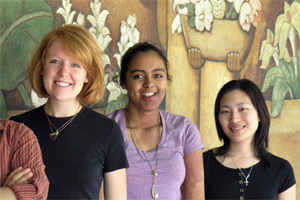 An Eye for Art: Zoe Larkins ’09
An Eye for Art: Zoe Larkins ’09
Williamson Gallery Summer Internship
For art history major Zoe Larkins, researching, cataloguing and helping create the Andy Warhol photographic display at the Ruth Chandler Williamson Gallery was a dream come true. It came about when gallery director Mary Davis MacNaughton ’70 suggested that Larkins apply for the 10-week summer internship last year, sponsored by Jane (’64) and Michael Wilson.
Larkins researched Andy Warhol in preparation for a proposed exhibition of 155 photographs he took in the 1970s and 80s, which the gallery received in 2008 from the Andy Warhol Foundation for the Visual Arts. Larkins read Warhol’s Diaries, then contacted and interviewed key members of the Factory scene, including Gerard Malanga, Mary Woronov, Christopher Makos, and Brigid Berlin. She has continued on the Warhol project as an intern this year for a Warhol show that will open in fall 2011.
Larkins also worked on a grant application to the Judith Rothschild Foundation for funds to purchase photographs by Esther Bubley and Marion Post Wolcott. Both of these women worked with photographer Roy Stryker at the Office of War Information and the Farm Security Administration during the Depression and WWII. In addition, Larkins worked as MacNaughton’s office assistant.
Larkins, as well as other Scripps students, consider MacNaughton a key mentor. “She has introduced me to many of the people she knows in the arts, at both for-profit and non-profit organizations, in the LA area. From these connections, I have developed my own. This summer, I will be interning at LACMA with Senior Modern Art Curator and Scripps trustee Stephanie Barron.”
With MacNaughton’s help, Larkins was accepted to the Courtauld Institute of Art in London, home to one of the finest small art museums in the world. She will be the seventh Scripps student admitted to the Courtauld, supported by the Jungels-Winkler Foundation Fellowship, following Jennifer Brown ’00, Abigail Ley ’01, Lily Mitchem ’05, Caitlin Silberman ’06, Geneva Griswold ’07, and Valérie Whitacre ’08. At the Courtault, Zoe will join Professor Julian Stallabrass’s section, titled “Aestheticising Polities? The Political in Globalised Contemporary Art.” Larkins said, “At the gallery, I became interested in pursuing a graduate degree in art history, and what I did there prepared me to do so.”
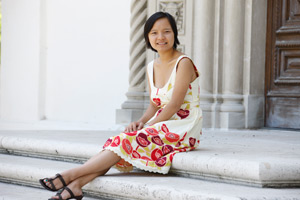 Duyen Tran ’10
Duyen Tran ’10
IIPP Fellow
As an Institute for International Public Policy (IIPP) fellow, Duyen Tran is participating in a prestigious and unique five-year, multi-part program. It includes a combination of short seven-week summer global policy institutes; a study abroad opportunity that focuses on global public policy, service and research; and a master’s degree program in international affairs that provides up to $15,000 in matching funds to fellows.
In May 2008, Tran began her fellowship by studying discrimination in the HIV/AIDS communities in Ho Chi Minh City and Hanoi, Vietnam. For two weeks, Tran researched the effectiveness of two key non-government organizations that worked with the HIV/AIDS communities and other NGOs. Then, she returned to the U.S. in the summer for the seven-week fellowship program at Spelman College.
The politics and international relations major found the last two weeks of the summer program took learning to a new level. IIPP fellows went to New York and Washington, DC, to meet with United Nations officials and explore international community organizations. “We had one-on-one discussions with State Department members, as well as those at the World Bank and the International Monetary Fund.”
Later, Tran went back to Vietnam for her study-abroad semester. “When I was in Vietnam, I explored economic development further, and I want to continue to study the concept in Southeast Asia,” she says.

